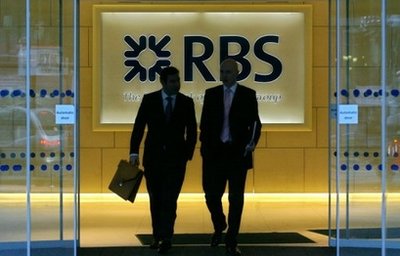British banks face tax on bonuses
LONDON: Britain's government is considering slapping a "supertax" on bankers' bonuses amid fears of a lavish season for senior staff despite the global financial crisis, reports said Monday.
Chancellor of the Exchequer Alistair Darling is mulling the levy on bankers handed bonuses above a certain level, and it could be included in his latest taxation and spending plans to be revealed on Wednesday, the Financial Times said.
Staff at British banks as well as the British arms of overseas-based firms, such as Goldman Sachs, JP Morgan and Deutsche Bank, could be hit with the new 12-month tax, the BBC said, citing unnamed Treasury officials.
The tax could appeal to voters in recession-hit Britain amid anger over huge bailouts to struggling banks following the global downturn, and a row over bonuses planned for staff at state-rescued Royal Bank of Scotland.
Chancellor of the Exchequer Darling delivers his pre-budget report against the backdrop of national debt and a record recession ahead of a general election by mid-2010 that his ruling Labour Party is tipped to lose.
Darling is expected to focus Wednesday on fixing Britain's public finances, which have buckled under the weight of the bailouts of the banks and a sharp economic downturn that has slashed taxation revenues.
Ahead of the report, Prime Minister Gordon Brown will set out plans for cutting public spending by 12 billion pounds over four years, as he details the government's plans to slash the massive budget deficit.
Brown will outline the "efficiency savings" in a speech Monday.
"The proposals we are setting out in this plan - which is just one element of our efforts to reduce the deficit - will go further than we have ever gone before in streamlining central government," Brown is to say.
Darling on Sunday told BBC television that the government would not be "held to ransom" over bonuses but appeared to play down the prospect of new taxes on the financial sector.
"We are not going to be held to ransom by people who believe you can pay extraordinarily high bonuses without regard to what's going on," he said.
"With all matters of tax - whether it's individuals, whether it's companies - you've got to be fair, you've got to be reasonable," he added.
"You've also got to have an eye on what the long-term result of all this might be."
The move comes as RBS, 70-percent state-owned, reportedly wants to pay 1.5 billion pounds (1.6 billion euros, 2.4 billion dollars) in bonuses to banking staff, and the board has threatened to quit if the government blocks the move.
Some observers blame the bonus culture of the world's two pre-eminent financial sectors -- the City of London and Wall Street -- for encouraging excessive risk-taking, which helped to tip the global economy into chaos.






